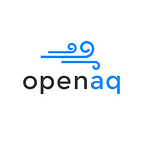FILLING IN KEY DATA GAPS: PLATFORM CONTRIBUTIONS FROM AROUND THE GLOBE
By Chisato Calvert, Deputy Director of OpenAQ
This is the second story within a broader contributors series featuring OpenAQ Community members and their impact.
Just as the world’s tallest skyscrapers require strong foundations from which to be built, the most effective solutions to combat air pollution require access to data. While the data-sharing infrastructure is invisible, we believe that it is foundational for solving one of the biggest environmental health threats of our time.
There is a common misconception that you need to be an “air quality expert” to fight air inequality. OpenAQ firmly believes that it takes a variety of expertise to more effectively create change in communities across the globe. This contributors series highlights impact profiles of key contributors that have played an integral role in ensuring that air quality data is made openly available to the public in the collective fight against air inequality.
Impact Profile: Dulguun Buttulga
Ulaanbaatar, Mongolia, often referred to as “UB” by its residents, is regularly ranked as one of the most polluted capital cities in the world. Freezing temperatures that plummet below -20 degrees Fahrenheit and atmospheric inversion during winter months form dense layers of smoke. Software developer, Dulguun Battulga was born in Ulaanbaatar and spent his whole life growing up with this seasonal air pollution. In 2012, the Mongolian government began investing more heavily in a ground monitoring air quality data system in order to raise awareness of pollution levels among city residents.
“Walking around UB, you would see these [air quality] monitors that supposedly recorded real-time air quality data. But I don’t think many people were paying attention to the [monitors] at the time,” Battulga explained. The Air Quality Index (AQI) that was projected on the monitors was the Mongolian government’s attempt to better communicate air quality levels. Rather than limiting air pollution to a subjective lived experience, an AQI made what people were breathing quantifiable. “This helped the public make correlation between what they were observing in their everyday lives with the scientific data,” Battulga explained.
In November 2015, Battulga learned about a community workshop that OpenAQ was organizing on air pollution and open data. Intrigued by the topic, he applied to participate with an open mind. “Having grown up in a city that confronts poor air quality every year and having a strong interest in data, I was really excited to participate in an open source project,” Battulga explained.
He joined 17 other dedicated people including journalists, scientists, and researchers that were all engaged in air quality work. “I was really inspired by the people in the room. They all came from different backgrounds and asked really interesting questions. It motivated me even more to think about what I can do to make a difference.”
During the workshop, Battulga engaged in a small group discussion about air quality forecasting and how to utilize open data to improve the health of children and infants in the city. For Battulga, this was just the beginning. “To me, OpenAQ was something that I can directly get involved in and help build. Particularly, to test myself to see if I can actually help on the projects. My engagement started from small things like contributing to a new adapter, making API improvements and fixes,” he explained.
Following the workshop, Battulga contributed to the OpenAQ platform in numerous ways. One particularly important contribution was in Tuzla, Bosnia. At the time, OpenAQ was conducting a workshop in Sarajevo on how to access the OpenAQ platform and co-ideate ideas to push for policy change. Having learned that there were some challenges in recording real-time air quality data in Tuzla, Battulga was dedicated to making this more accessible. While there were some challenges with the Bosnian language, Dulguun was able to decode some of the data that was available through google translate. “While it was a bit tricky, I was able to do some “detective” work to decode certain parts, while others were more noticeable including PM and microgram.” The reason why this contribution was so valuable was because at the time, Bosnian citizens were manually recording the air quality by hand. Dulguun helped build the adapter to make a difference in automating this system.
Since then, Battulga has contributed to a number of other sources including Moscow, South Africa, Italy, among others. For Battulga, his engagement with OpenAQ has spanned over 5 years, and he sees his role as more of a community manager.
“Right now, I’m doing my best to be a resource for people. I want to help manage the contributions that are coming onto the OpenAQ Platform, and help answer questions as they come up. I genuinely enjoy being able to engage on Slack and help people who want to contribute to the OpenAQ platform.
